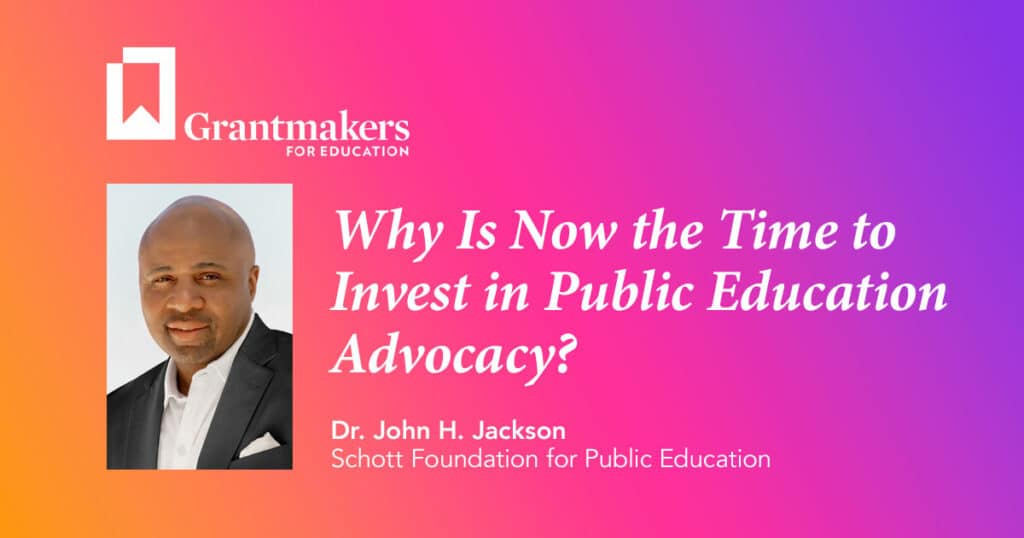News
Why Is Now the Time to Invest in Public Education Advocacy?

Originally published at Grantmakers for Education.
Last fall’s school board election results were a watershed moment. They revealed strong support for inclusive and accurate public education across the country and proved the power of grassroots movement building. Despite attention-grabbing headlines during the campaign, anti-democratic funders were mostly unsuccessful at the ballot box.
Instead, candidates who campaigned on inclusive and anti-racist public education gained much more of public school parents’ support. And it appears these candidates also gained their grandparents and neighbors’ support — even for adding education funding in Kentucky.
For us at Schott, this is heartening, but not surprising. For years now, student and parent organizers have been successfully advancing culturally responsive curriculum, inclusive policies, mental health supports for students and equitable funding in communities across the country – Georgia, North Carolina, Arkansas, Illinois, Ohio, Wisconsin, Kentucky, Louisiana, Michigan, Virginia, Pennsylvania, and Massachusetts, among others. And it looks like their work means more voters are supporting public school students and families.
Funders should take note: grantmakers who want to strengthen public education and support multi-racial democracy can invest in this growing BIPOC and community-led movement – a critical pathway forward.
Yet, as the Schott Foundation will detail in a soon-to-be-released report in partnership with Candid, just 0.3% of all K-12 philanthropic dollars were invested in racial justice between 2019 and 2021 (a drop of almost half compared to 2018-2020). In this essay, I argue that now is the time to invest substantially more in public education advocacy.
Democracy at Work: Our Public Schools
Our public schools are one of the few remaining public spheres where communities and families work together to decide local policy and unify around the core supports for children to learn and succeed – especially for Black and brown students. They are a perfect place to bring communities together.
Our public schools are not only places of learning but also the place for the next generation to establish, co-create and evolve their civic governance and societal norms. This is what the far right knows and what philanthropies who won’t fund public education advocacy must reconcile.
The drop in philanthropic support for racial justice work in education has left a void that those who oppose a multi-racial democracy are more than happy to fill. They spread narratives that public education is a failing effort and draft policy proposals designed to send public dollars to private schools.
Groups like Moms for Liberty try to pass policies to ban books, whitewash curriculum and create vouchers for wealthy parents to send their children to private schools with public dollars. What they frame as anti-“CRT” are a host of policies rooted in anti-Black, anti-LGBTQ and anti-democratic values. They are trying to weaponize public education to dismantle the values of a multi-racial democracy: equity, fairness and inclusion.
Institutionalized Lovelessness
Providing all students an opportunity to learn and thrive at its core is not just an education or policy issue. Let’s be clear: the systemic extraction of resources through policies like voucher schemes and tax cuts for the wealthy on the backs of public education students and their families is “institutionalized lovelessness.”
After all, you feed those you love, you clothe those you love, you ensure that those you love have shelter. Yet in too many cities, Black and brown communities are less likely to feel that love. Students deserve to grow up in a better world than that.
A true power of love, as much as some seek to systemically extract it from spaces, is that it can be systemically infused into institutions and systems. This is the precise meaning and work of philanthropy — “love for humanity.”
Public Education Advocacy: When Will Philanthropy Walk the Talk?
For decades, organizations and leaders of color have been among the few forces advancing multi-racial democracy and racial justice across the country through organizing and advocacy. Groups like Alliance for Quality Education in New York, Education Justice Alliance in North Carolina, ARISE in Providence, Rhode Island, Families and Friends of Louisiana’s Incarcerated Children, and Boston Education Justice Alliance are showing up at school board meetings. They are organizing at state capitols. They are registering voters. They are sustaining our democracy and protecting our constitutional rights.
Yet, these BIPOC-led organizations remain grossly underfunded, despite philanthropy’s stated commitments to advancing racial justice.
As a Black executive in philanthropy, this is personal. Public education is one of the last remaining mandatory public goods for children and families; it is a cornerstone for a multi-racial democracy. The narrative being promoted of public education being a failing enterprise is a part of the movement to destroy democracy which leaves children and families as casualties.
As philanthropic professionals, we have the ability to catalyze and accelerate movements. If ever we were to do so, now is the time. These election results provide yet another strategic rationale for us all to support public education advocacy. Let’s seize this opportunity to fulfill the meaning of the word philanthropy: let us show our “love for humanity.”
Dr. John H. Jackson is President & CEO of the Schott Foundation for Public Education.



